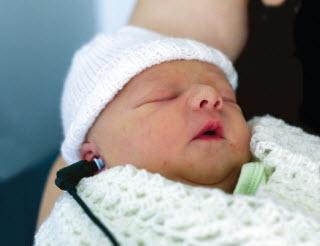- Home
- News
- Screening Matters, Issue 42, October 2013
- NSU and DHBs progressing recommendations from newborn hearing screening programme quality improvement review
News
- Screening Matters Newsletter
- April 2019
- April 2018
- December 2017
- August 2017
- April 2017
- December 2016
- October 2016
- March 2016
- November 2015
- August 2015
- June 2015
- April 2015
- February 2015
- December 2014
- October 2014
- August 2014
- June 2014
- April 2014
- February 2014
- December 2013
- October 2013
- August 2013
- June 2013
- April 2013
- February 2013
Screening Matters
The National Screening Unit newsletter
In this issue:
- Newborn hearing screening ‘best thing for your child’
- Many advantages for private provider in electronic colposcopy reporting
- Regional Screening Services Wellington spreads the word to new immigrants
- NSU and DHBs progressing recommendations from newborn hearing screening programme quality improvement review
- Reminder about timing of bloods for antenatal screening for Down syndrome and other conditions
- Loud shirts all for a good cause
- Electronic colposcopy and the new colposcopy standards update
- Introducing Joyce Brown
- NCSP Register Central Team update
- Updated NCSP policy and standards: providing a laboratory service
- Otago and Southland breast screening services to be provided locally
NSU and DHBs progressing recommendations from newborn hearing screening programme quality improvement review

The review, released in January 2013, identified 21 recommendations. Some aim to improve DHBs’ service provision while others aim to strengthen leadership and surveillance of the programme by the NSU. Significant progress has already been made in a number of areas to strengthen the programme.
Comprehensive protocols for monitoring individual screener data have been provided to all DHBs, with the requirement to report against these directly to the NSU.
Improvements have been made to training and education for newborn hearing screening staff, including implementation of a new annual online assessment competency exercise (ACE) tool for screeners, effective January 2014, and resources for recruiting newborn hearing screeners and maintaining an engaged screening team. Practical workshops for screeners and audiologists were held at the recent Australasian Newborn Hearing Screening Conference in Auckland. View the conference papers and presentations here.
Activities required to co-ordinate the programme in DHBs range from oversight of the programme at a strategic level to the operational day-to-day management of newborn hearing screening. Tools have been developed to support DHBs to govern, plan and co-ordinate delivery of their UNHSEIP. Monthly teleconferences between the NSU and coordinators have enhanced sharing of information about programme changes and discussion of operational issues.
Revised UNHSEIP National Policy & Quality Standards have been issued to DHBs. The update strengthens the role of co-ordinators and audiologists in supporting the screening service. There is a strong recommendation that programme coordinators undertake hands-on training in newborn hearing screening to better support the screener role.
An Australian team has been contracted to undertake a review of the newborn hearing screening test regime for the New Zealand UNHSEIP. This will include a literature review, review of test protocols in comparable overseas programmes and consideration of specific screening devices. Programme staff and other key stakeholders are being involved at various points of the review. The review, with recommendations for change/no-change to UNHSEIP screening protocol, will be completed by March 2014.
In DHBs there are many examples of ways the UNHSEIP is working to best meet the needs of local communities.
In Taranaki, the screener and coordinator attended a meeting with local Tamariki Ora nurses from health provider Tui Ora at their own rooms. The nurses now feel more confident in explaining the newborn hearing screening programme to whanau, and both screeners and the local Tamariki Ora nurses feel more comfortable contacting each other about any issues that arise with babies and whanau in relation to the programme or audiology, such as whānau who did not attend appointments.
Canterbury DHB uses a ‘partnership worker’ role based at most GP practices in Christchurch. The partnership community workers all have health-related backgrounds. Their role is to assist families to attend primary health care appointments, including newborn hearing screening and audiology.
To receive the Screening Matters newsletter by email, fill out our sign-up form.

